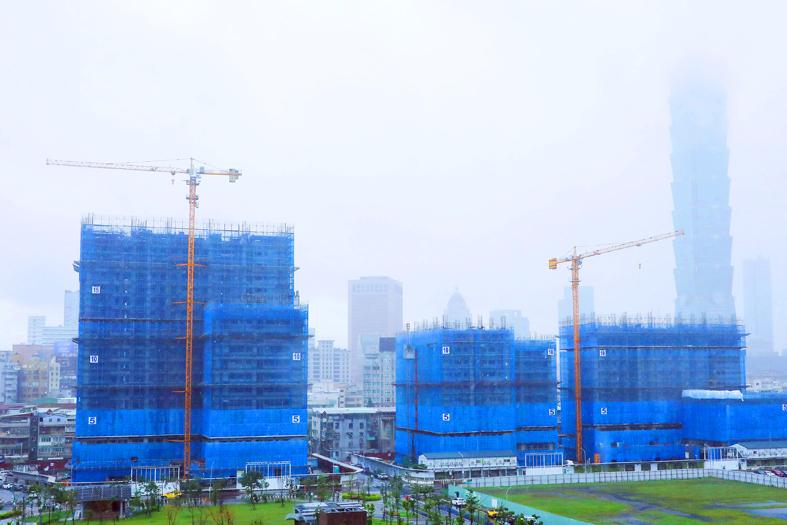Housing transactions last month retained their resiliency from October, as inflation concerns supported buyer interest, but the Omicron variant of SARS-CoV-2 increased uncertainty over a global recovery, local property brokers said yesterday.
Evertrust Rehousing Co (永慶房屋) said that housing deals at its offices across Taiwan last month stayed on a par with October, in line with seasonality.
This quarter is the peak sales season and the momentum might last ahead of the Lunar New Year holiday, Evertrust research department deputy head Chen Chin-ping (陳金萍) said.

Photo: Annabelle Chih, Reuters
A stable economy, mounting inflationary pressures and low interest rates all bode well for property sales, as real estate remains a solid choice among Taiwanese to defend against inflation, Chen said, adding that buyers would close on properties they consider to be fairly priced.
Buyers had better exercise caution when balancing their finances with interest in buying real estate, as the central bank might raise interest rates next year to help rein in inflation, she said.
Sinyi Realty Inc (信義房屋) said that it saw housing transactions last month grow 2 percent from October, mainly due to relocation and investment needs.
Toward the end of the month, apartments priced at more than NT$20 million (US$719,166) gained appeal, and trading in Taipei and New Taipei City is catching up with sales in central and southern Taiwan, Sinyi said.
Plans by major local tech firms to set up new plants in Taichung, Tainan and Kaohsiung have significantly pushed up housing prices in those areas, and buyers have grown cautious, it said.
However, the market appeared unaffected by the central bank’s tightening of rules regarding second-home mortgages in the six special municipalities and Hsinchu city and county, Sinyi research manager Tseng Ching-der (曾進德) said.
Tseng voiced concern that the monetary policymaker might introduce further credit controls so that the housing market has a “soft landing.”
H&B Realty Co (住商不動產) reported that trading last month fell 6.6 percent from October, while Chinatrust Real Estate Co (中信房屋) reported a 3.5 percent decline, as buyers and sellers increasingly disagreed on pricing.
H&B said that sellers in Kaohsiung drastically raised their asking prices after Taiwan Semiconductor Manufacturing Co (台積電) announced plans to build new factories in the southern city, which scared away buyers.
Chinatrust said that the outlook for property sales looks bright if Taiwan can ward off uncertainty linked with the Omicron variant.

UNCERTAINTY: Innolux activated a stringent supply chain management mechanism, as it did during the COVID-19 pandemic, to ensure optimal inventory levels for customers Flat-panel display makers AUO Corp (友達) and Innolux Corp (群創) yesterday said that about 12 to 20 percent of their display business is at risk of potential US tariffs and that they would relocate production or shipment destinations to mitigate the levies’ effects. US tariffs would have a direct impact of US$200 million on AUO’s revenue, company chairman Paul Peng (彭雙浪) told reporters on the sidelines of the Touch Taiwan trade show in Taipei yesterday. That would make up about 12 percent of the company’s overall revenue. To cope with the tariff uncertainty, AUO plans to allocate its production to manufacturing facilities in

TAKING STOCK: A Taiwanese cookware firm in Vietnam urged customers to assess inventory or place orders early so shipments can reach the US while tariffs are paused Taiwanese businesses in Vietnam are exploring alternatives after the White House imposed a 46 percent import duty on Vietnamese goods, following US President Donald Trump’s announcement of “reciprocal” tariffs on the US’ trading partners. Lo Shih-liang (羅世良), chairman of Brico Industry Co (裕茂工業), a Taiwanese company that manufactures cast iron cookware and stove components in Vietnam, said that more than 40 percent of his business was tied to the US market, describing the constant US policy shifts as an emotional roller coaster. “I work during the day and stay up all night watching the news. I’ve been following US news until 3am

COLLABORATION: Given Taiwan’s key position in global supply chains, the US firm is discussing strategies with local partners and clients to deal with global uncertainties Advanced Micro Devices Inc (AMD) yesterday said it is meeting with local ecosystem partners, including Taiwan Semiconductor Manufacturing Co (TSMC, 台積電), to discuss strategies, including long-term manufacturing, to navigate uncertainties such as US tariffs, as Taiwan occupies an important position in global supply chains. AMD chief executive officer Lisa Su (蘇姿丰) told reporters that Taiwan is an important part of the chip designer’s ecosystem and she is discussing with partners and customers in Taiwan to forge strong collaborations on different areas during this critical period. AMD has just become the first artificial-intelligence (AI) server chip customer of TSMC to utilize its advanced

Six years ago, LVMH’s billionaire CEO Bernard Arnault and US President Donald Trump cut the blue ribbon on a factory in rural Texas that would make designer handbags for Louis Vuitton, one of the world’s best-known luxury brands. However, since the high-profile opening, the factory has faced a host of problems limiting production, 11 former Louis Vuitton employees said. The site has consistently ranked among the worst-performing for Louis Vuitton globally, “significantly” underperforming other facilities, said three former Louis Vuitton workers and a senior industry source, who cited internal rankings shared with staff. The plant’s problems — which have not